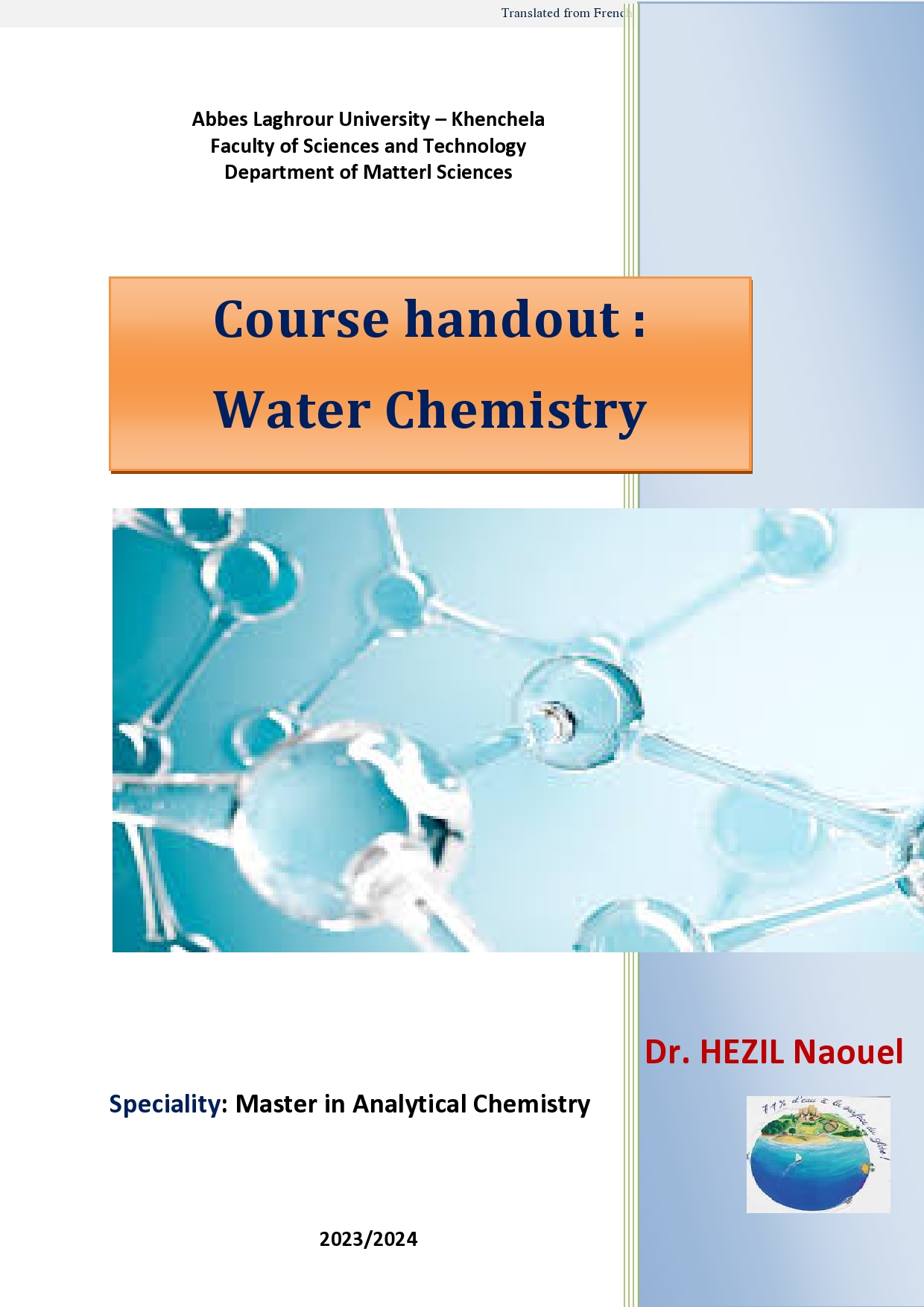The primary objective of this course is to familiarize students with spectroscopic methods, their basic principles, and their application in interpreting experimental spectra and determining the structures of organic molecules. This course assumes prior knowledge in general chemistry, including atomic structure, chemical bonding, and basic analytical techniques.
The content is divided into four main sections, ensuring a structured and comprehensive learning process:
1. Electron Paramagnetic Resonance (EPR): Introducing fundamental principles, instrumentation, hyperfine structure, and applications to radicals and triplet states.
2. Atomic and X-Ray Fluorescence: Covering theoretical aspects, modes of excitation, instrumentation, sample preparation, and industrial applications.
3. Atomic Emission Spectroscopy: Discussing the origin of atomic spectra, key principles, coupling techniques, and analytical applications.
4. Molecular Fluorescence and Chemiluminescence: Exploring fluorescence and phosphorescence, quantitative laws, Raman and Rayleigh scattering, instrumentation, and applications.
- معلم: Djohra Bedghiou

This scientific English aims to provide students with terminology linked to their fields of study and to enrich their cultures.
- معلم: Faiza Salhi
This document includes some simple practical work offered to master 01 analytical chemistry
students at Abbes Laghrour University –Khenchela-. This practical work should allow a better
understanding of the methods of eliminating the pollutants dispensed. The main objective is to
enable mastery of the elementary rules and basic principles relating to the different types of
water depollution generally carried out in laboratories.
- معلم: Amel Bouakkadia
Objectifs du cours
L’objet de ce cours est de sensibiliser les étudiants aux aspects économiques, environnementaux et sociaux liés à la production et l’utilisation des matériaux, en particulier du la chimie Analytique. Il interviendra relativement tôt dans le cursus, de façon à poser le cadre dans lequel viendront s’insérer les questions scientifiques et techniques traitées par les autres modules. Après un cours d’introduction sur les enjeux stratégiques du développement durable pour l’environnement, une part importante du cours sera consacrée à la gestion des impacts environnementaux des produits chimiques.
Connaissances préalables recommandées
Spécialisation environnement & stratégie du développement durable. Connaître les bases du droit de l’environnement industriel ou avoir suivi le cursus « Découvrir le droit de l’environnement industriel (niveau 1) », PROBLEME ENVIRONNEMENT
- معلم: Hamza Athmani

This course is an initiation to scientific communication in English.
Through different courses, students will learn how to use the main tools
of scientific communication in English, such as: understanding research
articles, writing an abstract, preparing oral presentation
on science and society topics,
- معلم: naouel Hezil

Water chemistry is a fundamental discipline that explores the
properties and chemical reactions of water, a molecule essential to life as we
know it. Because of its unique composition and its ability to dissolve many
substances, water plays a central role in a multitude of chemical, biological
and environmental processes.
This water chemistry course aims to provide a
thorough understanding of the fundamental principles that govern water
behavior. We will explore key concepts such as water molecular structure,
intermolecular forces, physical and chemical properties of water, as well as
specific chemical balances related to water.
An important part of this course will focus on the
calco-carbonic balance of water, which is the equilibrium system between carbon
dioxide (CO2), carbonic acid (H2CO3) and
hydrogen carbonate ions (HCO3-) and carbonate (CO32-).
We will study the reactions that govern this balance, the factors that
influence it, and the environmental and biological consequences of this balance
We will also discuss redox reactions involving
water, notions of pH and acidity, buffering properties of water, and oxidation
and reduction reactions that occur in aqueous systems.
This course will focus on applying theoretical concepts to concrete examples, and will provide essential tools to understand the chemical reactions that take place in aqueous solutions, as well as environmental issues related to water.
It is recommended to have a solid foundation in general chemistry and chemistry solutions to get the most out of this course. Water chemistry is an exciting and relevant discipline that will find applications in many fields including chemistry, biology, medicine, environmental engineering and many more.
Get ready to explore the fascinating world of water chemistry and develop a deep understanding of this crucial molecule that supports life on our planet. Enjoy reading and learning!
- معلم: naouel Hezil
Les matériaux adsorbants jouent un rôle crucial dans de nombreux domaines de la chimie, de l'industrie et de l'environnement. Leur capacité à retenir sélectivement des molécules ou des ions à leur surface les rend indispensables dans des applications telles que la purification de l'eau, la séparation des composés chimiques, la capture des polluants et même la formulation de médicaments. Comprendre comment les matériaux adsorbants fonctionnent et interagissent avec les molécules cibles est essentiel pour développer des solutions efficaces aux défis scientifiques et technologiques contemporains.
Au cours de ce cours, vous serez amenés à explorer divers types de matériaux adsorbants, tels que des charbons actifs, des zéolithes, des polymères poreux et des argiles. Vous découvrirez comment préparer ces matériaux, les caractériser à l'aide de techniques analytiques appropriées et évaluer leurs performances en termes de capacité d'adsorption, de sélectivité et de cinétique. Vous apprendrez également à interpréter les données expérimentales pour obtenir des informations précieuses sur les processus d'adsorption et pour évaluer les performances des matériaux adsorbants.
- معلم: naouel Hezil